Tax experts are hopeful Finance Minister Pranab Mukherjee will increase the income tax exemption limit to Rs 2 lakh (Rs 200,000) per annum from Rs 1.6 lakh (Rs 160,000) to bring the rates in line with the Direct Taxes Code.
"To align the exemption limits under personal income tax with DTC, the Centre is likely to raise the IT exemption limit to 2 lakh (Rs 200,000)," Balbir Singh Mastan, Partner, DSK Legal said.
High inflation, particularly in the food items, also makes a strong case for raising the tax exemption limit, experts argue.
"Taking into account rising inflation, the government could raise personal I-T exemption limit," tax consultant Subhash Lakhotia said.
He further said that in the wake of the issues related to increasing black money, the government should limit tax rates to up to 20 per cent for individuals and 25 per cent for corporates.
Tax gurus also said the limit for exemption through saving schemes like investments in provident fund and infrastructure bonds, may also be raised from the current Rs 1.2 lakh (Rs 120,000).
. . .
FM to raise I-T exemption to Rs 2 lakh?
"The finance minister is expected to raise the deduction under 80 C of IT (tax saving) to Rs 1.5 lakh (Rs 150,000)," Tax consultant Rakesh Gupta said.
In the budget of 2010-11, deduction of an additional amount of Rs 20,000 was allowed, over and above Rs 1 lakh (Rs 100,000) on tax savings, for investment in long-term infrastructure bonds.
Aseem Chawla, Partner in Amarchand & Mangaldas, however, does not expect that Mukherjee would make any changes in rates of Corporate Tax and Minimum Alternate Tax but feels excise duty could be raised.
"The Corporate Tax and MAT will remain unchanged. The excise duty will be raised by 2 per cent," Chawla said.
The government is also likely to announce relief in the housing loan segment. They also expect Mukherjee to bring healthcare segment into service tax net.
Meanwhile, economists are expecting the government to further liberalise the foreign direct investment regime to contain the dip in FDI inflows.
"Budget may contain steps to improve the FDI situation in the country, by introducing some procedural simplifications as well as opening up the FDI for more sectors," said Crisil's chief economist D K Joshi.
. . .
FM to raise I-T exemption to Rs 2 lakh?
Sops likely for salaried class, farmers
Finance Minister Pranab Mukherjee is likely to give tax concessions to the salaried class and offer incentives to farmers in his Budget 2011-12 in a short while from now to give relief from high prices and keeping an eye on elections in five states.
Mukherjee may also consider raising the limit for investment in tax-free infrastructure bonds to give a boost to the fund-starved sector. Investments up to Rs 20,000 in infrastructure bonds enjoy tax exemption now.
Experts said with fiscal deficit projected to come down sharply to 4.8 per cent, the Finance Minister would have some leeway to provide these tax concessions.
The Economic Survey 2010-11 presented in Parliament projected fiscal deficit at 4.8 per cent, down from the budget estimate of 5.5 per cent for the current fiscal.
With five states -- Assam, Tamil Nadu, Puducherry, Kerala and West Bengal-- heading for polls, it is unlikely that Mukherjee would completely roll back the stimulus and come out with harsh measures to increase government revenues and bring down fiscal deficit, experts said.
. . .
FM to raise I-T exemption to Rs 2 lakh?
Mukherjee's third consecutive budget is also expected to increase the credit flow to the farm sector.
On tax rationalisation, Mukherjee had said, "The sustained growth has been possible due to rationalisation of tax structure, improvement in tax administration and persistent efforts of the employees of Income Tax department."
Inflation has remained above the comfort level for most part of the current fiscal and will be another focus area for Mukherjee.
The overall inflation at 8.23 per cent is higher than the comfort level of the Reserve Bank at 5-6 per cent. Food inflation had also touched at a high of 18.23 per cent in December, but moderated to 11.49 per cent in mid-February.
Industry fears that Mukherjee may roll back some of the stimulus to fight inflation. Moreover, the Survey had also projected the economy is recovering fast and is expected to return to the pre-crisis growth rate of 9 per cent in 2011-12.
. . .
FM to raise I-T exemption to Rs 2 lakh?
Budget to decide the stock market sentiment
When the Union Budget 2011-12 is tabled in Parliament, it can be a "game changer" for the stock market, which is currently grappling with macro-concerns, including inflation and the crisis situation in the Middle East and North Africa, say experts.
Steaming crude oil prices spiked by political tensions in Libya pulled down the BSE benchmark Sensex by 2.8 per cent or over 510 points to 17,700.91 level last week. Further, the Sensex witnessed a single day sell-off of over 500 points on Thursday---its biggest decline since August 2009.
"There is a very strong possibility that the Union Budget could be a game changer as far as the direction of the stock market is concerned. The market has a very strong inertia (right now)... If there is one event that can change that, it would be the Union Budget," said Motilal Oswal Financial Services CMD Motilal Oswal.
According to market observers, the Economic Survey and the Railway Budget 2011-2012 announced on Friday, emerged as non-events for the Dalal Street, which is now keenly awaiting positive surprises from the Union Budget.
. . .
FM to raise I-T exemption to Rs 2 lakh?
"We see amnesty scheme, agriculture focus and easing of infra funding issues as the key addressable areas, which could enthuse the equity market.
Besides, a complete excise duty roll-back by 2 per cent and higher fiscal deficit target of 5.5 per cent, if announced, would be major negative surprises," said IIFL head of research Amar Ambani.
The markets usually rally before the budget in anticipation of big measures but then get disappointed when the government cannot provide all that the market wants in the finance bill.
Experts tell that this time the expectations are low and the market may actually react positively to any rational measures in the finance bill.
They add the stock market that has plummeted by 13.69 per cent in the year so far, can perk up after the budget announcement on indications of lowering of hurdles on funding and, implementation and execution of projects in key sectors.
"Market performance may be better post-budget as the long-term structural story of India remains intact and investors could take positives from any significant investment plans and execution methodology towards that story," MAPE Securities head of research Kislay Kanth said.
At the same time, market observers also point out that though the Union Budget will be an important event next week, external developments, especially in the Middle-East and North Africa, will also be crucial in steering the stock market.
. . .
FM to raise I-T exemption to Rs 2 lakh?
Budget may give boost to infrastructure
Pranab Mukherjee is likely to announce steps to boost the infrastructure sector in his Budget with a view to sustaining over 9 per cent growth in the coming years.
The initiatives could include raising the limit for investment in tax saving infrastructure bonds and providing special thrust to plan expenditure for sectors like road, energy, ports, airports etc.
Currently, investments up to Rs 20,000 per annum in infrastructure bonds enjoy tax exemption.
Mukherjee may also announce setting up an Infra Debt Fund (IDF), as was suggested by an expert panel headed by HDFC chief Deepak Parekh in June, 2010 to resolve financing issues of the sector.
The Parekh Committee had recommended setting up IDF with an initial corpus of Rs 50,000 crore (Rs 500 billion) for financing projects in this crucial sector and was to be managed and regulated by market regulator SEBI.
. . .
FM to raise I-T exemption to Rs 2 lakh?
The fund, aimed at providing longer-term capital to infrastructure, could provide a boost to the public-private partnership (PPP) projects, thereby pushing investments in key areas like roads, ports and power, among others.
According to the Economic Survey for 2010-11, 293 projects or over 52 per cent of the ongoing 559 infrastructure projects are running behind schedule as on October, 2010 and steps are required to accelerate the pace of infrastructure development further.
. . .
FM to raise I-T exemption to Rs 2 lakh?
FM's Budget Speech to be 80th in India's history
It will be the 80th budget speech presentation in the history of independent India, when Finance Minister Pranab Mukherjee reads out his taxation and other economic policies before Parliament.
Parliament has so far hosted 79 budget speeches, including interim and special situation budgetary proposals, ever since the country's first union budget presented by then Finance Minister R K Shanmukham Chetty on November 26, 1947.
For individual records, Mukherjee would present the budget for sixth time in history, thus becoming the finance minister to have made third highest number of budget speeches.
The maximum number of 10 budgets have been presented by Morarji Desai, while P Chidambaram, Yashwant Sinha, Y B Chavan and C D Deshmukh have presented seven budgets each.
Mukherjee would join the league of Prime Minister Manmohan Singh and the country's fourth Finance Minister T T Krishnamachari, who have presented six speeches each during their tenures in the finance ministry.
So far, Mukherjee have presented four annual budgets, including the one for the current fiscal 2010-11, and one interim budget for the fiscal 2009-10.
. . .
FM to raise I-T exemption to Rs 2 lakh?
Among others, R Venkatraman and H M Patel have presented three budgets each, while Jaswant Singh, V P Singh, C Subramaniam, John Mathai and R K Shanmukham Chetty have two budgets each to their credits.
Besides, Jawahar Lal Nehru, Indira Gandhi, Rajiv Gandhi, Charan Singh, N D Tiwari, Madhu Dandwate, S B Chavan and Sachindra Chaurdhuri have presented one budget each.
The budget was presented by Nehru, Indira and Rajiv Gandhi in their capacity as Prime Minister and Minister of Finance.
Charan Singh (once) and Morarji Desai (on four occasions) presented budget as Deputy PM and Minister of Finance.
So far, a total of 12 interim budgets and four special-occasion budgetary proposals, also known as mini budgets, have been presented before Parliamant, while the remaining 64 have been normal annual budgets.
The first such mini-budget was presented by T T Krishnamachari on November 30,1956 in form of fresh taxation proposals through Finance Bills, demanded by the prevailing domestic and international economic situation.
The step was also required to tackle issues like rising inflation and dwindling forex reserves at that time.
The second mid-year budget taxation proposals were also presented by Krishnamachari in August 1965, while the third mini-budget was presented by Y B Chavan in December 1971 wherein he proposed additional measures for mobilisation of resources for defence requirements.
The last mini-budget proposals in the Parliament was also made by Chavan in July 1974, wherein he made fresh taxation proposals to tackle inflation-related issues after only five months of the regular annual budget.
. . .
FM to raise I-T exemption to Rs 2 lakh?
Budget may contain some relief for exporters
Finance Minister Pranab Mukherjee is likely to accept exporters demand, like extension of concessional credit scheme, when he presents the General Budget in Parliament.
While exports are showing healthy growth rate of over 29 per cent, exporters are hoping that Mukherjee would not roll back the stimulus as demand in the western markets are still fragile and uneven.
In its pre-Budget meeting, apex exporters body FIEO has also demanded that the income tax benefit available to Export Oriented Units (EOUs) and Software Technology Park Units (STPIs) should be extended for another three years.
The benefits under EOUs and STPIs would expire on March 31.
The government provides 2 per cent interest rebate on export credit and the scheme is scheduled to expire on March 31.
India's exports are likely to touch $225 billion during the current fiscal. The commerce ministry is aiming that exports would touch $450 billion in the next three years.
. . .
FM to raise I-T exemption to Rs 2 lakh?
CII expects budget to boost investments
Business chamber Confederation of Indian Industry is looking forward to measures that will encourage investments in the country and hopes the government will not raise indirect taxes from the current levels.
"With the economy having recovered steadily from the downturn, the industry is looking for a new phase of steady investment and growth.
The Budget can provide policy direction by announcing measures to encourage investments, which will offset the negative impact of rising interest rates," CII director general Chandrajit Banerjee said in a statement.
While making reference to high inflation rates, Banerjee said he expected no hike in indirect taxes.
"Given the inflationary environment, indirect tax rates are maintained at current levels and aligned with the proposed rates under GST (goods and services tax)," Banerjee said.
Food inflation was reported 11.49 per cent for the week ended on February 12.
Further, he said the finance minister could also use this opportunity to reform agricultural markets so that the episodic food inflation can be avoided.
"Investment in agriculture and rural infrastructure is required to be stepped up in order to improve the productivity of crops," Banerjee said.
Pointing to the latest Economic Survey, he said that the roadmap towards fiscal consolidation should be maintained.
"Any increase in the deficit could put pressure on interest rates to increase and negate any positive impact of the policy announcements," Banerjee said.
The recent Economic Survey has pegged the fiscal deficit for 2010-11 at 4.8 per cent, lower than the Budgetary estimates of 5.5 per cent, on the back of higher realisation from 3G spectrum auction and buoyancy in revenues.
India's fiscal deficit, which had ballooned to 6.3 per cent of the GDP in 2009-10 in view of the stimulus spending worth billions of dollars to combat global financial meltdown, is pegged at 5.5 per cent for the current fiscal.






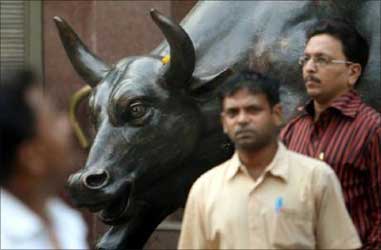
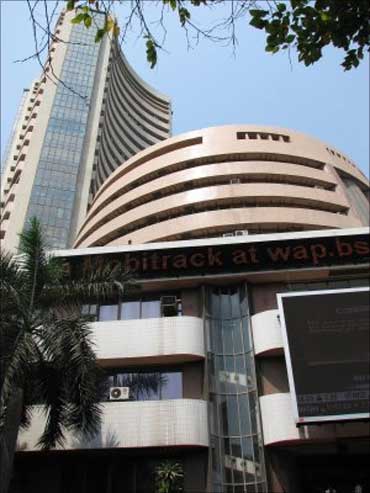
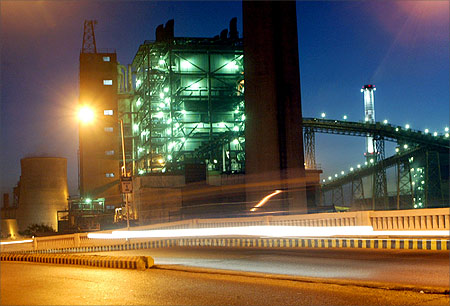
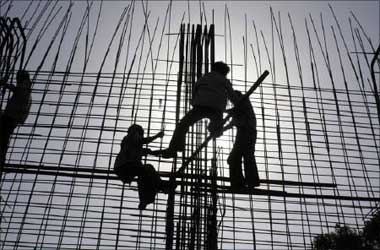
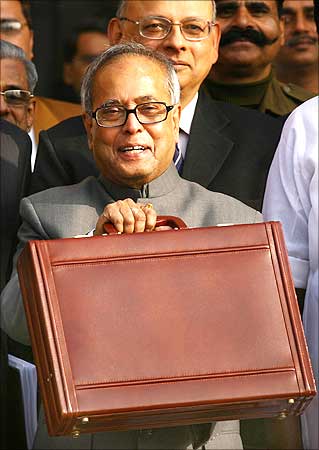

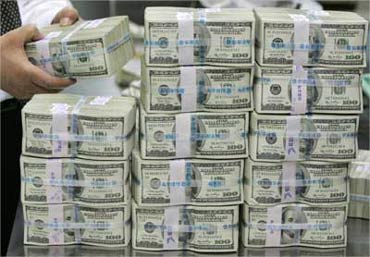

article